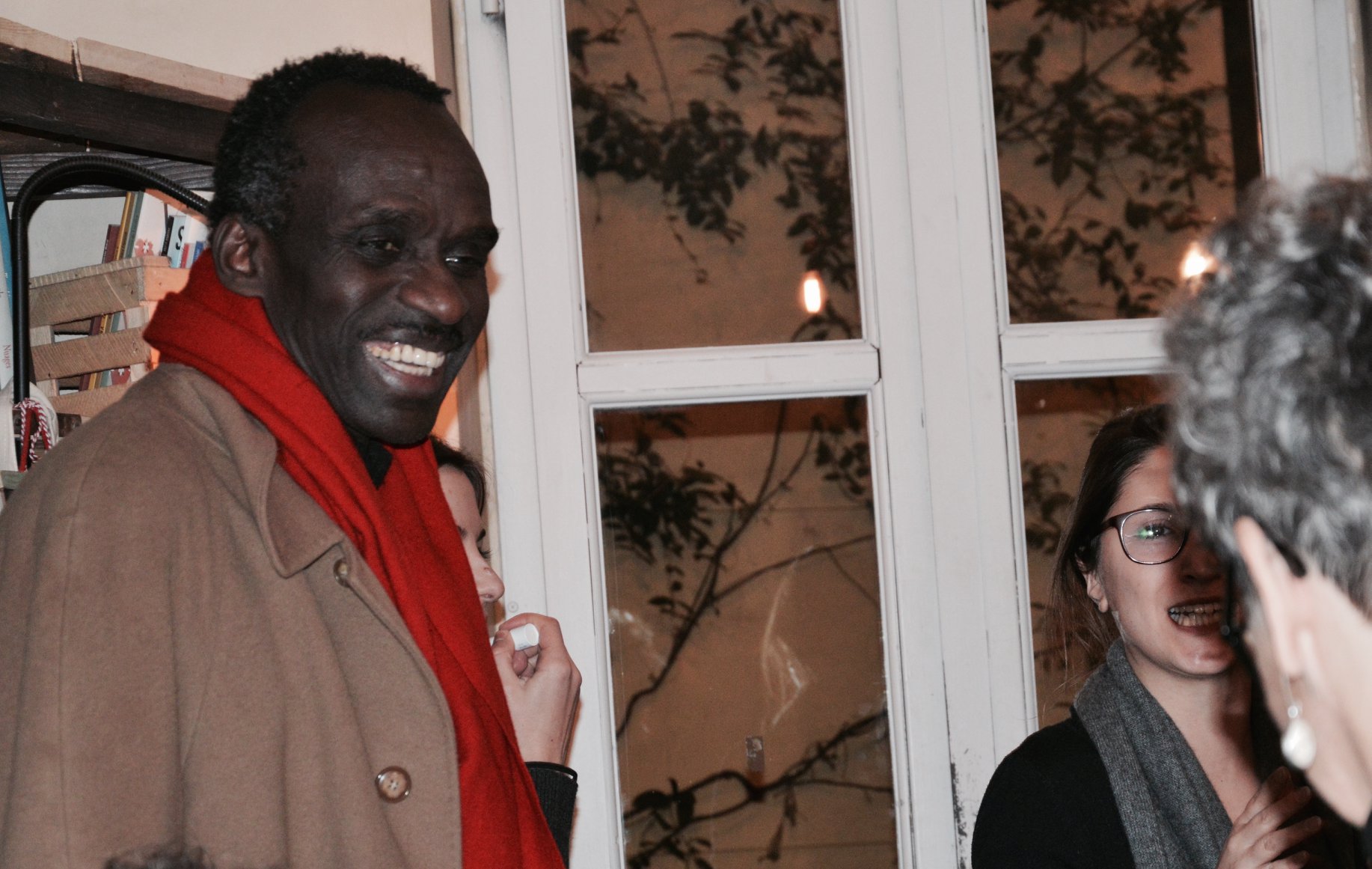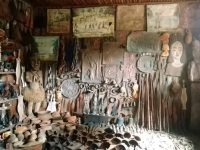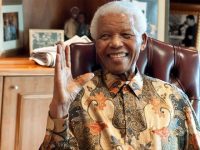A beacon of culture Located in the province of Kwilu, the Gungu Museum on Congolese…

Migration, reflections and commitment of Pap Khouma, writer and journalist
In the last thirty years, Italy has undergone almost a revolution. From being a country of emigration, it has reversed course and become a country of immigration. The presence of newcomers on Italian soil has not always been welcomed, and the topic of migration still appears to be addressed with monotonous, and often alarming, responses.
To counterbalance this inhospitable rhetoric in the country, what do people of foreign origin present in Italy think? How much do they feel represented? How autonomously can they do so? Are the world of communication, civil society organisations and institutions at the national level in step with the times and the physiognomy of the societies we live in?
I talked about this in this interview with Pap Khouma, a well-known writer and journalist of Senegalese origin, who has lived in Milan for about forty years. He has been a member of the Register of Journalists since 1994 and is now a member of the Board of ItaliaHello, an organisation that addresses people with a migrant background to offer them quality and multilingual information, useful and easily accessible, with a view to better understanding our country and to better orientate themselves in their daily lives.
Writer and journalist, Senegalese by birth and now an Italian citizen.
Who is Pap Abdoulaye Khouma?
I have been in Italy for I don’t know how many decades now, almost four.
Like so many migrants, I was passing through Italy. I arrived here in the 1980s, when there were still no specific laws for arrivals.
In fact, I can tell you that those arriving from sub-Saharan Africa or the Maghreb (with a few exceptions) were automatically clandestine.
The moment I decided to stay, I became aware that no one would give us our rights and, for that reason, I knew I would have to fight. I therefore founded (together with friends) a migrants’ association with the support of civil society, the trade union and some Catholic communities.
This association brought together mainly Senegalese, but not only. Many other foreign communities in Italy at the time did not have representatives nor were they present (numerically speaking) as we Senegalese or as Moroccans and Egyptians. At our meetings, held mainly in Wolof or French, we also met with someone from the Ivory Coast, Gambia or Guinea Conakry. We always took language difficulties into account and I remember that from the beginning we committed ourselves to providing a translation service, especially in meetings with trade unionists or when discussing regulations and provisions that affected us and Italy.
We were therefore mainly Senegalese but we were aware that what we were talking about was of interest to everyone. We were talking about the Burkinabé not understood, the Ivorian not listened to. The problems were common.
Many people came to me for suggestions for difficulties they did not know how to answer. Sometimes even I did not know how and what to do, but I was their spokesperson before the municipality on behalf of all of us. To lead claims in the name of our rights, we who paradoxically were street vendors in the streets and squares of Milan, meant however to pay on our own skin with the intimidation of the police, who saw us in the squares and got to know us and who, after the demonstrations, came to our homes to keep us locked up for two or three days. It was terrible.
It is these moments here, it is these struggles and these needs that have driven me to write, to put down on paper what I have and we have experienced.
From Io, venditore di elefanti to Noi Italiani Neri and the latest works between Senegal and Italy, you therefore write to denounce and bear witness to what a person with a migrant background in Italy is forced to experience. What changes have you noticed over the years in terms of reception in our country?
Io, venditore di elefanti is my first book (written together with journalist Oreste Pivetta). In this work, I recount the episodes barely mentioned, but I do not tell the whole story. At the time, I was not ready yet to put on paper all the humiliations I experienced or the humiliations of my friends. I still could not bring myself to recount the words that others addressed to us, without knowing us. Without asking permission.
Since this first book, many things have changed, for better and for worse, in many ways.
Whereas in the period I shared in Io, venditore di elefanti 98 out of 100 Senegalese were illegal immigrants, now it is perhaps the opposite and out of 100 Senegalese only two are illegal immigrants. This is a remarkable change, especially in terms of rights. But it is certainly not all that simple.
Those who have obtained Italian citizenship today are people who have resided in Italy for more than forty years. If the first amnesties in the country could be called clear, today they are very confused. I give you the example of the Bossi-Fini, a law that has been in place for twenty years that risks bringing people back into clandestine conditions, people who have been living in Italy for years and who have families, mortgages or, more simply after years, a daily life of their own here.
When I tell of my struggles in Io, elephant seller, there were not yet my children. Now you have to look at them too, and those who were children then, adults now. You have to think about family reunions, about the children who came to Italy and grew up here. We should also pause to reflect on the new logics of migration, which are different from those of the 1980s.
To do so, it would be necessary to rethink certain provisions and norms that are not in step yet with the times and the physiognomy of our societies. And I would add one more thing.
In the last twenty-five years, maybe thirty, there is a lot more propaganda related to migration and migrants. When I arrived in Italy illegally, communication was not so interested in us. Maybe not even politics. Today, the latter exploits migration and its people, forges more and more relations with the mainstream media to carry out an incorrect and, above all, strategic and manipulative propaganda of contents and perceptions in exchange for votes.
As a journalist, what contribution can your colleagues make to less Eurocentric or more real communication?
I am quoting a Latin locution from ancient Rome. Hic sunt Leone. In Roman times, this expression referred to people from the African continent and the unknown lands of the continent. As if there were only animals on the other side.
What was Rome yesterday, is Italy today. I would say Europe.
There are certainly voices outside the chorus, professional and otherwise, who are committed to a different narrative. However, as one is wont to say, these are individual drops in the ocean. Drops that are certainly part of a whole and, therefore, play their part.
Personally, since 1989 and even before, I have tried to give a voice to people of foreign origin and migrants, but today more than ever the media is not in the business of offering a real narrative of Africa, beyond pessimistic, reductive or alarming visions. Often, when talking about migrants or people of foreign origin, there is this tendency to highlight negative aspects, to point fingers, to generalise, forgetting (perhaps intentionally) that we are individuals. We are people and not masses. There is so much more to tell.
To give you an example. A few years ago, at the Expo in Milan, with a photography school in the city, we presented a photo shoot of a team including young people, children of migration born and raised here by parents of foreign origin. These young people brought back snapshots of the lives and individual stories of some migrants that were different from what we are used to seeing and hearing. These shots portrayed African doctors, dancers, choreographers and photographers. They were lived shots, different shots. Today it is easier, or more convenient, to link the migrant with danger, to confuse the non-EU citizen with the person of African or Afro-descent, and the foreigner with the Muslim faith, and this with fanaticism. Today, whether you are from Senegal or Gambia, you can find yourself in the headlines as ‘the North African’. The press doesn’t want to specify and I don’t know if it does so out of ignorance or with very specific intentions. We go on with wrong generalisations that, if shared, will continue to create clichés on these issues.
As a writer and as a journalist, I have been working for thirty years against these generalisations, but the questions we should be asking ourselves are ‘How many journalists and writers of African origin exist in Italy today? How much space do they have? What voices do you hear of African origin on television?”
I have often been invited to television programmes but I stopped attending them. They are spaces designed to raise voices, to argue and to provoke. Sometimes I have been invited with the specific intention of confronting this or that person, but what interest do I have in doing this?
Italy unfortunately feeds this kind of narrative. Moreover, not all people of African descent protect the diasporas. Many times they are the first ones here, from Italy, who repeat ‘Let’s help them at home’.
But I will dwell on the point related to journalism with a question that is meant to be food for thought. It is true that there is a specific code and rules of deontology belonging to the order of journalists, but what is the limit – in my opinion very thin – between deontology and freedom of expression?
Can literature be a form of vindication? Has it been in the past? Is it perhaps easier than journalism?
There are many paths, cultural and otherwise.
In 2002, when the phenomenon of migration writing was gaining ground, we founded a literary magazine (www.el-ghibli.org) to collect the contributions of those who wrote and did not have the possibility to publish their texts. Back then, there was not the potential of social media that we benefit from today.
Today we can move more freely and I will give you an example. During the lockdown in 2020, when Covid locked Italy in, the media rightly showed doctors as heroes, among the most exposed, but never doctors or nurses of foreign origin. I know for a fact that in Italy there are foreign figures in the world of medicine and pharmacology, so why this choice?
Today, several months later, I tell you that I made a mistake in asking why. Rather, I should have told you myself and, with the tools we have today, I could have easily done so.
This is what the younger, newer and middle generations do.
This is the case of the Kirikù association in Milan, animated by Jermay Michael Gabriel and others, artists, painters and writers born, raised here or adopted from Africa, Brazil or India. This is the case of Djarah Kan, who is very active. It is also the case of the writer Igiaba Scego and the trade unionist Aboubacar Soumahoro. These are a few examples to say that today there are many young people, and not only them, who are very smart and very angry.
We try to get in touch with them, but rightly so. We have done forty years of struggle and, at a certain point, you get wiser or perhaps just more tired. Even in Senegal I remember carrying on my battles in the streets of Dakar in a country that always recognised civil society. Today in Italy it is the same young people who, often not feeling rightly represented either socially or in the labour market, leave.
However, I do not only want to talk about the difficulties. There are also many aspects that are changing. There are positive realities. Unfortunately, we are so used to defending ourselves that we only dwell on more complex aspects.
What about your presence in ItaliaHello team?
I am part of the board of directors of ItaliaHello, a company I met during a conference at New York University in Florence. Since then, a few years ago, my collaboration took off and I had the opportunity to enhance what I was doing before individually, joining a team of experienced and competent people. I was a free hitter. However, if you are alone playing a drum, you definitely make your music heard, but if you play within an orchestra, the music is louder, as well as more harmonious.
With Italia Hello, I therefore had this opportunity. In the course of my life, I have entered national organisations and bodies several times with noble intentions, realising with time that protagonism and problems made me turn away from them. About ItaliaHello I admire its continuity and concreteness. It has a structure that combines competence, willpower and passion.
What has come out of ItaliaHello is a person-friendly support for the foreign communities on the territory. Independence and inclusion are achieved through informed and conscious choices. If you do not know how the new society you live in works, you are not able to be fully autonomous, but there will always be someone to decide for you.
I will also give you the example of the projects that we engage with foreign communities in Italy on the issue of work. It seems trivial, but digital can be a valuable ally to help in the creation of a complete curriculum vitae, in preparing for interviews and, again, in the search for job offers suited to one’s skills. I believe that the projects and initiatives promoted by ItaliaHello in this sense are an important tool to grant them greater autonomy, bearing in mind the importance that work takes on in the lives of each of us today. As much from an economic power point of view as from a relational and exchange point of view.
Equally fundamental is the team behind ItaliaHello, which brings together people with different profiles and skills from different countries. This choice has made it possible from the very beginning, and still does, to have new insights that an Italian often does not think of when addressing a person from another country. Not out of malice, but we are used to not entering into the cultural and traditional sphere of the people we work with/for. Knowing and having one’s own western mentality but also enjoying another country’s background or constant exchange with colleagues from other realities is what makes the difference I was born in Senegal and grew up in Italy, I boast a hybrid mentality. I have colleagues from Italy, but also from Albania, China and Mexico. This hybrid mentality is a typical trait of Italy Hello. These are objective solutions and, I repeat, within concrete reach for everyone and ready to give people direct representation. Without lowering everything from above and rather listening in a relationship that is born and developed on the same level.
In the light of your past and in the face of these answers, what are your feelings today? Are we taking the right steps to have the right representation of diasporas and foreign communities in Italy?
I give you the example of my latest work, the translation of a canto from Dante’s Inferno. Beyond the difficulties of translation and metrics, of different contexts and words between the two languages – Italian and Wolof -, this undertaking of mine was a challenge but also a way to build a bridge between Italy and Senegal. For years here in Italy, I have been fighting to make known and tell many aspects of my culture, my country and the African continent. This time I did something else. I wanted to find a way to tell a part of Italy in Senegal. For me it was a reconciliation activity and I did it for the children, for the younger ones, for my daughter who has never gone to Africa.
We also have to do and leave things for them and for tomorrow. As I told you, I have lived here for many years. It is still an endless examination for me. It is a constant having to confirm. It is a constant having to prove. Always, still years later, something. I am an Italian citizen and I am told ‘yes Italian citizen but not of Italian nationality’.
There is a weight on me. The same weight that drives so many boys and girls to leave after their studies. One gives in to this system, perhaps. There are many people of good will, so many. I think the majority. I know Italy in depth, from Tirolo to Palermo, and there are so many people, journalists, professionals and citizens of goodwill. However, I agree with Martin Luther King who said that one hears more the cry of the bad guys, even if they are in the minority, than the silence of the good majority. And he is right. For me this is Italy today.





